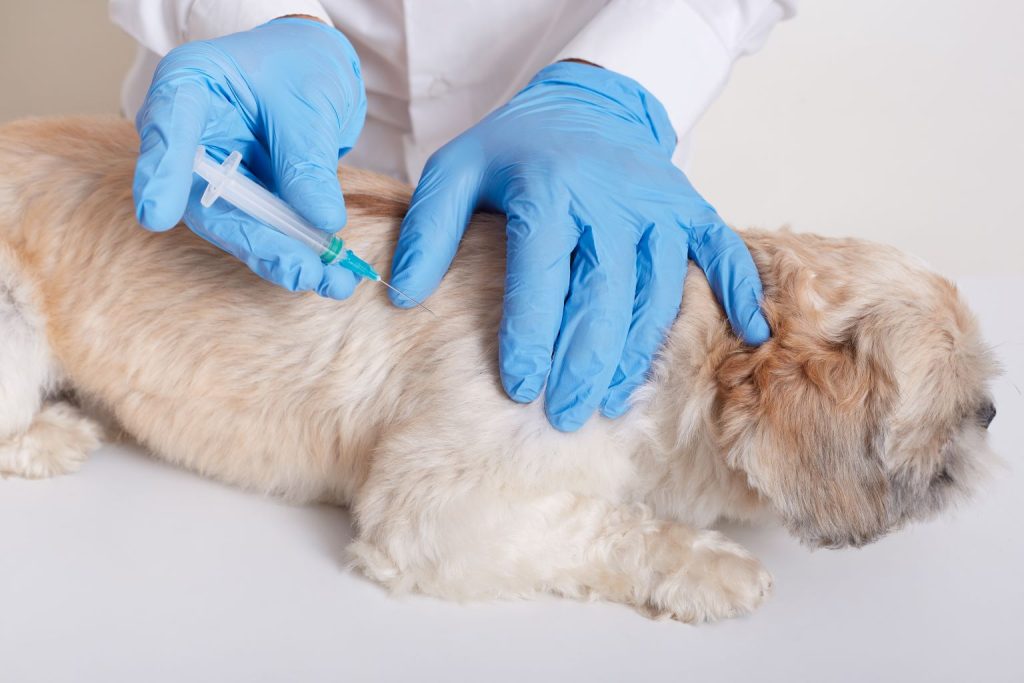To keep your dog healthy, it is more than just regularly feeding and exercising your dog. Vaccinating your dog protects them from serious health issues, like rabies, parvovirus, and distemper.
Dog vaccinations help your dog’s immune system recognize the infection to fight it off, which can help the dog avoid a serious illness or death.
How Can a Vet Near You Help With Vaccinations?
When you go to a vet near you, your dog will get the correct vaccines at the appropriate time.
Each time you visit the vet, there is an opportunity to check how your dog is doing, discuss side effects and whether vaccination is appropriate, and discuss whether a booster shot is needed or necessary.
Having a local vet makes it easy to keep your pet up-to-date on all necessary vaccinations.
What Are the Benefits of Dog Vaccines?
Vaccines do not just prevent the disease; they protect your dog and the people who live with the dog. The benefits of dog vaccines include:
- Prevent a contagious disease that can be fatal
- Reduced risk of transmission to other pets
- To help dogs live longer, healthier lives
- To save pet owners from lengthy and extensive costly medical treatment.
These dog vaccine benefits, including your dog’s vet shot, are something to think of as an investment in your dog’s long-term health.
What Does A Typical Dog Vaccination Schedule Look Like?
A dog vaccination schedule assists owners in helping to develop a lifelong vaccination schedule to ensure protection.
Puppies begin to receive vaccinations with multiple vaccines (better known as a series of vaccinations) provided as soon as possible, sometimes between 6 and 8 weeks old, followed by boosters every 3–4 weeks until about 16 weeks.
After 16 weeks old, dogs receive annual booster vaccines, but this can vary according to your vet.
Example Puppy Vaccination Schedule:
| Age | Vaccines |
| 6–8 weeks | Distemper, Parvovirus |
| 10–12 weeks | Distemper, Parvovirus, Hepatitis |
| 14–16 weeks | Rabies, Bordetella (optional) |
| Adult | Annual boosters as recommended |
The dog vaccination schedule helps ensure the family can stay safe and keep their dog’s immune system healthy to build a well-developed system to combat and recognize, and fight infection.
Can Vaccinations Prevent Expensive Vet Visits?
Yes. Vaccinations help prevent serious illnesses that can require costly treatments. A single vet visit for a vaccination is much less expensive than hospitalization for a preventable disease. Protecting your dog now saves money and stress later.
How Often Should The Vet Vaccinate My Dog?
Puppies should receive more vaccines in the first month(s) of life. Adult dogs usually require boosters once a year or as advised by your vet. Staying consistent with the vaccination schedule helps keep your dog protected against diseases.
Protecting Your Dog Through Vaccines
Vaccinations are the best way to help your day stay healthy, safe, and happy. At Greenpoint Veterinary Care, we offer professional care to help your pets receive the right vaccines at the right time.
Schedule an appointment to give your dog a lifetime of health and happiness.
Frequently Asked Questions
Why do dogs need vaccinations?
Vaccines protect dogs against diseases like rabies, parvovirus, and distemper, and help your dogs feel safe and healthy.
How often should my dog get vaccines?
Puppies should receive vaccinations every few weeks until they are 16 weeks old. Adult dogs usually get a booster shot once yearly, or as directed by the vet.
Can vaccines make my dog sick?
Most dogs can handle vaccines. Some may be sore or have a low-grade fever for a day or two, but bad reactions do not happen very often.
Are vaccines really worth the cost?
Yes. Vaccinations protect from deadly diseases that are expensive to treat. It will cost you less money now, but save you money and keep your dog healthy in the long term.








